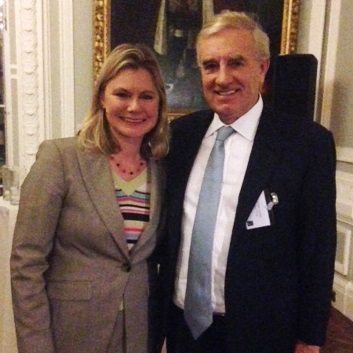Opinion
James Turner reports on the launch of Sutton Scholars
“If we are going to make the most of our talented young people, we need to find ways of more systematically ‘mining’ their talent base … With awareness, with greater knowledge then comes an ability to assess and get those choices right”. So said Justine Greening, secretary of State for International Development, at the launch of our new Sutton Scholars programme on Monday night.
We couldn’t have put it better ourselves. While we are of course very proud of the achievements of our flagship university summer schools programme – which has helped tens of thousands of low and middle income sixth formers progress to the country’s leading universities over the last 17 years – we recognise that by working with seventeen and eighteen year olds we can only do so much. Because we know that too many bright students from low and middle income homes are lost in the system by the time they reach GCSE. With the best will in the world, they are simply not in a position to get into the country’s leading universities.
And this is where Sutton Scholars comes in: supporting bright students in comprehensive state schools early on, to keep their aspirations, engagement and achievement as high as possible, so that they are in a good position to benefit from what is next in their educational journey. This includes, we hope, a place on our summer schools and Pathways programmes, or one of the many initiatives run by universities up and down the country, as the next step towards studying for a top degree. As the Secretary of State put it, “this programme is doing the right thing at the right time. It’s trying to bend the arc of opportunity, early, for young people who can do and be so much more, so much faster.”
Justine Greening has a remarkable story of social mobility herself. From a comprehensive school in Rotherham, the daughter of a steel worker made redundant in the 1980s, she has risen to the Cabinet. The challenge for Sutton Scholars is to make similar routes of social mobility the rule not the exception.
By working in partnership with four leading universities – Cambridge, Nottingham, Warwick and UCL – with funding from the Wolfson and Sofronie Foundations – the expanded pilot scheme will reach 400 students a year. Pupils in Years 7, 8 and 9 who are in the top 10% of the ability range and from schools working in challenging circumstances will be selected to take part in regular academic seminars, skills sessions and campus visits run by the universities. We will also be offering support to their teachers and parents as well as undergraduate mentors. Scholars has been designed to dovetail with existing provision and to fill the gap in activity that there is in key stage 3 (age 11 to 14). So where a good pre-GCSE programme exists, Scholars will feed into that; where there is less provision, or it can fill a distinct need, it will be extended to GCSE.
The evidence tells us that the challenge for Sutton Scholars is significant. Research from the Social Mobility and Child Poverty Commission earlier this year found the early promise shown by the brightest poor students can be lost as they progress through school, particularly between ages 11 and 16. Data from the Organisation for Economic Co-operation and Development (OECD) finds that the UK compares poorly in international comparisons of the highly able. Around half the number of UK students reach the highest levels in maths at age 15 compared to the average for developed nations, and the UK ranks 26th out of 34 OECD countries for the performance of its brightest students. And the Trust’s own work has revealed a staggering pool of 60,000 young people who were once among the top performers in their year group, but who don’t end up going to university.
Which is why as well as wanting to develop and expand Sutton Scholars to many more leading universities to reach hundreds more young people, we are also calling on government to devote ring-fenced funding to support bright students in state schools and academies. The old gifted and talented schemes had their problems, but at least it was money and attention devoted this often neglected group. Of course, Sutton Scholars is just one way to support these pupils: but whatever way headteachers choose – and that will depend on each school’s context – it should be evidence-based and robustly evaluated, as Scholars will be through our relationship with Durham University’s respected Centre for Evaluation and Monitoring.
But what is certain is that acting positively to address this challenge would be popular with those that matter most – parents and teachers. Our polling shows that 80% of parents think schools should provide specific programmes that give extra support for the most able students. And 90% of teachers questioned also thought it important that schools provide additional programmes for highly able or gifted and talented students. It is only with a significant partnership – between schools, universities, charities and others, backed with state funds – that we can really blow open the talent pipeline, which for too long has prematurely cut off bright students from poorer homes before they reach 16. The trickle of talented students from poorer background going to our top universities and into our top professions should become a torrent.
As the Secretary of State put it on Monday evening: “We often talk about social mobility as being about a ladder. I want to see that ladder turn into a conveyor belt, a conveyor belt of talent. Where young people can walk along it, where it’s already innately set up or designed to get them somewhere in the first place – to allow them to fulfil their potential, and in so doing, to fulfil Britain’s potential. Nothing less, should be acceptable to us.”
